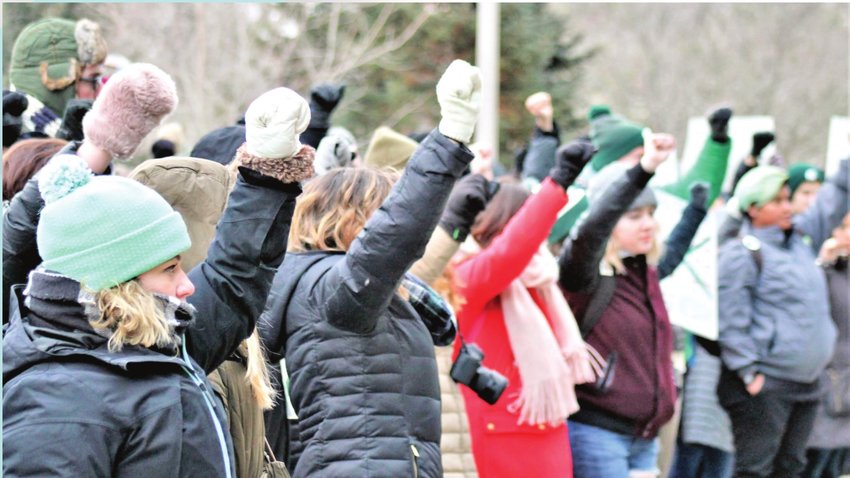
The academic year at MSU ended last week, as it always does, with graduation ceremonies, trees blossoming on campus and selfies with Sparty.
The sunny post-graduation stroll was grander than usual Saturday afternoon. Champagne bottles piled up next to Beaumont Tower as families jockeyed for photo ops. Three grads perched on the edge of the fountain in front of the library for a photo. One of them fell into the drink and climbed out, laughing.
In the sheltered grotto next to the tower, teal-colored ribbons were tied to the trunks of the blossoming trees. To many visitors, they seemed a part of the celebration.
Graduate Ryan Mack explained the purpose of the ribbons to his mother, Michelle, as they headed back to Spartan Stadium.
Tied conspicuously to hundreds of trees all over campus, each ribbon commemorates a survivor of sexual abuse.
Like the survivors themselves, they reveal a forest of pain, hidden in plain view. This has been a year like no other at MSU.
“I walk by them every day on campus, because you can’t forget,” Ryan Mack said.
Mack received two bachelor’s degrees Saturday, in physiology and human biology, with three minors — in Spanish, global health and epidemiology and bioethics. In a few weeks, he’ll be off to Chicago to study at Loyola University’s medical school.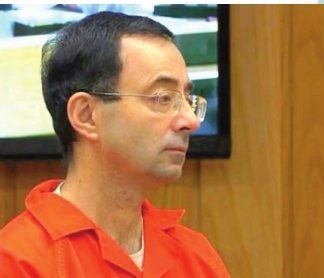
Busy as he’s been, the Larry Nassar scandal and subsequent turmoil at MSU was never far from his mind.
“I was asked about it on my med school interviews from other places, what the mood is at the school,” he said. “I tell them it concerns all the students and we’re all talking about it. It was in the thoughts of everyone who was interviewing for med school here. The D.O. (College of Osteopathic Medicine) school at MSU is having a lot of issues. I know people that aren’t going there because of the Nassar issues.”
His mother beamed at him proudly as he spoke, but Michelle Mack, a nurse anesthesiologist and MSU grad, said she feels that the scandals have “tainted” her own past.
“Everybody’s involved in this,” she said. “Anybody who hears a story needs to pay attention.”
Across the Red Cedar, Joshua and Drew Laske strolled next to Beaumont Tower. The brothers were both wearing gowns and serious expressions.
Drew Laske got his diploma in applied engineering that day and starts graduate school at Notre Dame in June.
“I‘ve been here five years and I love this place,” Drew said. “It pains me to see something like this could happen here, but I still love MSU. I want the survivors to know they’re not alone and we’re here for them.”
Joshua graduated Friday with a doctorate in the College of Veterinary Medicine and is headed for an internship in Los Angeles.
“I’ve done a lot of traveling around the country, externships with different hospitals, and unfortunately, it is the first thing that does get brought up when people hear I’m from Michigan State,” he said. “They say time heals all wounds but this one’s going to take a little bit more than time. It can’t just be swept under the rug. These issues need to be fixed.”
Cliffhanger
The MSU community didn’t just hope for closure in early 2018. When Larry Nassar was sentenced to 40 to 175 years in prison for multiple sex crimes in Ingham County Circuit Court in late January, a lot of people hoped to slam and bolt the door to the darkest place the university had ever been.
The high drama of late January promised closure of a sort. With a mix of disgust and admiration, the nation followed a week of harrowing impact statements by 156 women and girls who survived sexual abuse at the hands of a trusted MSU doctor and faculty member.
Several days later, President Lou Anna Simon resigned.
It seemed that closure might be possible with Nassar put away and Simon gone — sort of. Her cushy severance package hinted that the MSU administration still thought it was doing business as usual.
And the headlines kept coming. Despite calls for their resignation from students, faculty and state lawmakers, the Board of Trustees dug in deeper. They hastily picked a divisive interim president, former Gov. John Engler, who began to spar publicly with the university’s critics in the state Legislature, ESPN and even with Nassar survivors.
In March, Nassar’s boss, William Strampel, dean of the College of Osteopathic Medicine, was charged with an assortment of sex crimes.
It’s been a corrosive news drip for faculty and students as they carry on with their work.
“It’s been so hard to have people say things like ‘burn it to the ground and salt the earth,’” sociology Professor Stephanie Nawyn said. She is is also co-director for academic programs at the Center for Gender in Global Context, informally known as GenCen.
“It’s been really horrible to be a professor at MSU and have it seem like the entire university is just what’s coming out of the president’s office or the Board of Trustees,” she said.
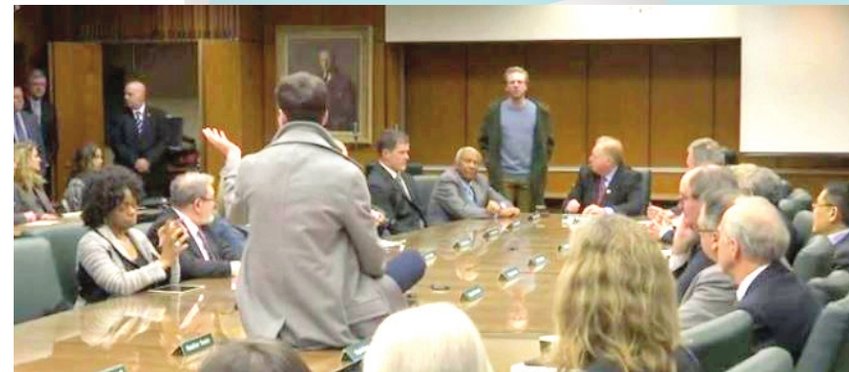
Tone deaf
Sherman Garnett, dean of MSU’s James Madison College, watched the drama of Nassar’s sentencing and Simon’s resignation from India. Checking the news in The New York Times and The Washington Post and scores on ESPN, he saw some familiar campus glades and buildings in film clips.
“Michigan State is rarely on ESPN, except for big basketball and football games,” Garnett said drily. “It gave me a different perspective. We — we weren’t doing well. We weren’t able to hear how tone deaf we sounded.”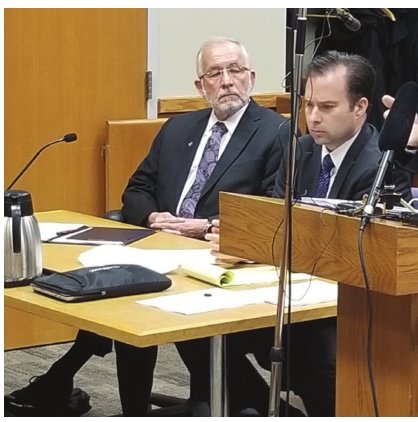
The administration’s defensive tone as the scandal broke moved Garnett to write an open letter to the MSU community Jan. 25.
“What I saw in our university’s response to the survivor statements in court from senior MSU spokespeople and leaders frankly made me ashamed,” he wrote. “We are so much better than this, so much more dedicated to fundamental human and humane values, than these words conveyed.”
Like thousands of other MSU faculty and students, Rocío Quispe-Agnoli, a professor of Latin American studies at MSU, feels like she spends most of her time fielding questions from colleagues and family, here and abroad.
“When the scandal was finally out in February, it was in the newspapers in Peru, in Spain, in other countries of Latin America,” she said. “It was in the newspapers in the UK, France.”
Anna Pegler-Gordon, an associate professor at James Madison College, was one of two faculty members who called for a vote of no confidence in Simon in the Faculty Senate. Simon resigned before the vote could be held.
“It’s the first thing people think about, either when you meet someone new, or when you catch up with colleagues,” Pegler-Gordon said.
She has given up on preparing a pat answer. “I haven’t developed a response because it keeps changing and getting worse,” she sighed.
As an expert in the Andean region, Quispe- Agnoli is known in Peru and other places in Latin America. “I felt embarrassed and I kept thinking, ‘I hope nobody asks me,’” she said. “Every time something comes up in the Chronicle of Higher Education about Michigan State, it’s always about Nassar, about Strampel.”
The year’s bad news even made her grateful for linguistic ambiguity. Translated into Spanish in newspaper reports, “Universidad Estatal de Michigan” sounds so similar to the University of Michigan that people confuse the two.
“I usually try to correct colleagues, but this time I was grateful that they don’t make the connection right away,” she said.
Not an island
Simon infamously told the trustees at an April 13, 2013, meeting, “I have been told it is virtually impossible to stop a determined sexual predator and pedophile, that they will go to incomprehensible lengths to keep what they do in the shadows.”
The narrative that Nassar was a freakish parasite who burrowed into Sparty’s muscle tissue and eluded detection despite everyone’s best efforts was always problematic. How could Nassar have molested some 300 women and girls without individual enablers, an enabling culture, or both?
Nassar survivors have alleged that their complaints to MSU officials had been ignored or silenced for years, going back to the mid-1990s.
Peter Secchia, who worked closely with Simon, has donated millions to MSU. The former ambassador to Italy under George H.W. Bush and chairman of the Republican National Committee ruffled members of the Board of Trustees when he gave his take on Nassar in an interview on WZZM in Grand Rapids in January.
“In many cases people made comments about Nassar and they were totally ignored because he was a rock star,” Secchia said.
It wasn’t just a “Nassar thing,” to borrow an infamous phrase uttered by trustee Joel Ferguson in a Jan. 23 radio interview. (The interview, which included praise of Simon’s fundraising skills and claimed the trustees took 10 minutes to decide she should stay, fouled the climate at MSU even more.)
In September 2015, the U.S. Department of Education’s Office for Civil Rights found that Michigan State was in violation of Title IX from 2009 to 2014, ruling that the school’s “failure to address complaints of sexual harassment and sexual violence in a prompt and equitable manner caused and may have contributed to a continuation of a sexually hostile environment.”
Since January, the narrative of the aberrant monster tainting an innocent institution — “a person on an island by himself,” in Ferguson’s words —has been blown completely.
The year’s low point for Pegler-Gordon came in late March, with a series of revelations about former Dean Strampel.
Strampel was arrested March 26 and charged with felony misconduct in office, criminal sexual conduct and willful neglect of duty by a public official, including propositioning and groping students.
“People protected Larry Nassar and said his patients don’t understand what’s happening, and that led to ongoing assaults,” Pegler-Gordon said. “It’s the same with Dean Strampel. They kept him as dean despite the extensive reports of sexual harassment. It continued for eight years and it was much worse than we ever imagined.”
Compounding the Strampel revelations, the Associated Press reported in late April that MSU maintained ties for 20 years to a volleyball coach banned by USA Volleyball for sexually abusing teenage girls.
Nationwide media treatment has not been kind. USA Today sports columnist Nancy Armour branded MSU “a cesspool of abuse and indifference with seemingly no bottom” in an April 24 column.
“We think we might have some good news to say about the university, and then I get a text — ‘Hey, did you see this?’” Nawyn said. “It’s one more scandalous thing. And most of the bad news comes from the top. It makes you feel undercut.”
March brought the revelation that MSU paid a New York PR firm $500,000 to track social media and other media accounts related to the Nassar scandal, including tweets and posts by survivors and their families.
“The only other person that monitored my social media profiles in an effort to discredit me, was my abuser, Larry Nassar,” survivor Rachel Denhollander told Fox News.
This was another tough one to take for students and faculty. “I can’t even begin to tell you the list of things $500,000 would be better spent on,” Nawyn said.
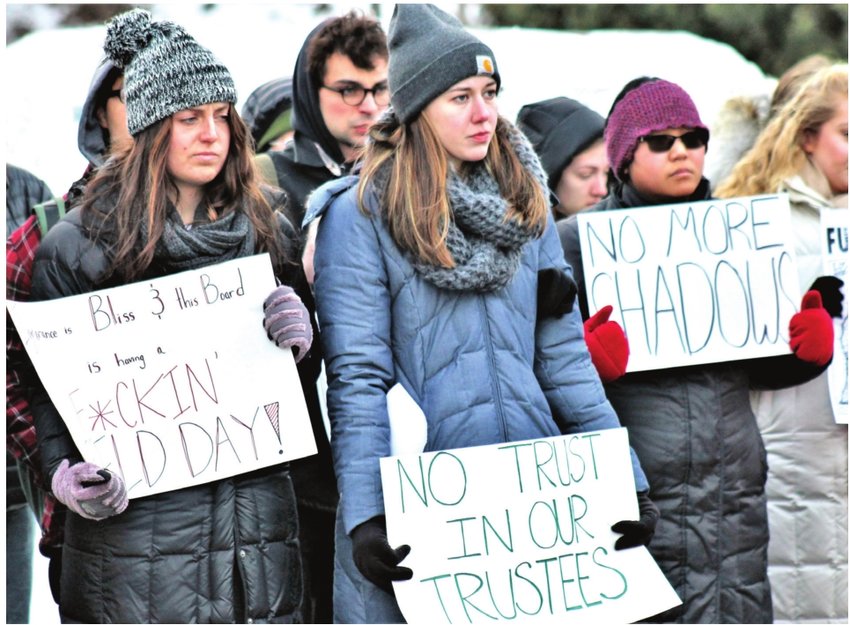
The Academic Congress, which consists of MSU’s entire faculty, approved a no-confidence vote in the trustees Feb. 3, by a margin of 1,907 to 192.
For Quispe-Agnoli, the following days were the most discouraging of the academic year.
“Nothing happened,” she said. “It was like talking to a wall. You think you are making a difference, doing your ethical and moral duty and nothing happens. That was demoralizing. What more do you have to do?” The Academic Congress vote was symbolic, but the chorus of crickets that followed was still deafening.
“When I tell colleagues about this, people are staggered that the Board of Trustees has not resigned,” she said.
Many MSU faculty members have become numb to the administration’s lack of engagement with them. Pegler- Gordon has no illusions that it will change. In January 2017, the Faculty Senate called for an independent investigation into the Nassar assaults and cover-ups.
“We were roundly dismissed back then,” Pegler- Gordon said. “My guess is that next year we will come back and this will continue.”
Lou Anna Simon’s platinum parachute, including a salary in the high six figures, vaguely defined duties and an office in the newly restored Willis House, made jaws drop until they detached.
“She has this sweet package in which she essentially does not have any responsibilities except for research, which is what we all do, unpaid, on our own time, during the summer, and she’s getting $750,000 for that,” Borcíla said. “I tell people that and they just don’t believe it.”
Gasoline on the fire
Simon herself had already set the stage for MSU’s maddening drip of post-Nassar torture with a tone-deaf resignation letter lowlighted by a textbook passive-aggressive swipe: “as tragedies are politicized, blame is inevitable.”
If any scabs were beginning to form over MSU’s wounds, the trustees’ unanimous pick of Engler as interim president Jan. 31 rudely ripped them off.
Engler vowed change at MSU, but Spartans with longer memories recalled that as governor in 1998, he blocked a United Nations investigator from looking into allegations of sexual abuse in state prisons and led a legal fight against a Justice Department probe into sexual abuse and inadequate care in prisons.
Engler called the U.N. “an unwitting tool in the Justice Department’s agenda to discredit the State of Michigan.”
The investigations ended up costing the state $160 million in lawsuit judgments from inmates who were raped or abused.
MSU student President Lorenzo Santavicca was among student leaders asked by the administration what they hoped to see in the next president.
“We had said we needed someone who is a listener, a healer, and someone who is going to be actively engaged in this community,” Santavicca said in an interview with The Atlantic magazine. “Those comments, we thought, would go into consideration. And lo and behold, hours later they already had their decision made up who they were going to bring in—John Engler.”
The day after Engler’s appointment, a Feb. 1 town hall meeting at MSU turned into a Krakatoa of anger, as hundreds of fed-up students, staff and community members lined up outside the Kellogg Center to get into a jammed hall.
A partial transcript hints at the degree of outrage, directed largely at MSU Trustee Brian Mosallam, the only trustee to attend.
“I’m a grad at MSU,” one speaker declared. “I have two sons here. I don’t want to give another dime to MSU. My daughter said the only good thing in all of this is that ‘you’ve stopped bugging me to go to MSU.’ I’m appalled at the process we’ve done to choose Engler.”
Several survivors of childhood molestation said they felt re-victimized by MSU’s treatment of Nassar survivors, by Engler’s appointment and the board’s seeming indifference.
“Voting Engler in is an insult to survivors,” a graduating senior said. “You endorse someone who doesn’t care about assault. I am going to MSU for grad school and I regret it every single day.”
Andulana Borcila, an associate professor at James Madison College, was deeply shaken by the meeting.
“I sat and listened to all the powerful stories of peoples’ experiences on this campus with not being listened to after they had been assaulted,” she said.
A few days later, Borcíla joined a new group, Reclaim MSU, that formed in the wake of the town hall.
“I wanted to work with students, staff and other faculty to push for change, more broadly and deeply,” she said.
Poor judgment
If Engler’s past made him a controversial choice, his tone after taking office did little to dispel doubts about him.
On March 28, Engler met with Nassar survivor Kaylee Lorincz. Engler’s support among the trustees began to crack. “At no time did this Board authorize this Administration to interact directly with our courageous survivors or their families,” Mosallam wrote in a letter to an MSU attorney quoted in The Detroit News. Mosallam called the meeting “exceptionally poor judgment.” In another email, trustee Diane Byrum said it is “very problematic and highly inappropriate to be speaking with the Survivors or their families.”
It got worse when Lorincz told the trustees April 13 that at the meeting, Engler offered her $250,000 to settle her lawsuit against the university.
Carol Viventi, an MSU vice president and special counsel to the president, poured fuel on the fire when she wrote in an email, made public by The Detroit News, that Lorincz’s statements were “outrageously distorted” and accused her of trying to “set up” MSU to sweeten a possible settlement deal.
Viventi’s email is particularly interesting because it offers a glimpse at the tone many people imagine MSU administrators use when they talk about Nassar victims in private conversations. Engler refrained from publicly contradicting Lorincz, Viventi wrote, over “concern for the survivors who are quick to claim ‘revictimization’ or ‘shaming’ of survivors whenever they are falsely accusing members of the MSU community.”
The parade of bad news obscured genuine progress.
The MSU sexual assault program has added two therapists, two victim advocates and a full-time crisis counselor, funded by secure grants form the state Department of Health and Human Services and authorized by the 1984 Victims of Crime Act. The cavalry is overdue, as the number of clients seeking help from the sexual assault program has ballooned from 260 in 2007 to more than 600 in 2017, according to data from MSU.
The university has also set up a new Title IX Prevention, Outreach and Education Office, staffed by six new positions, including a “male engagement specialist,” that will specialize in faculty and staff education and community outreach.
Before these changes were made in early 2018, MSU had one full-time employee dedicated to prevention programming.
“There’s lots of good things going on on the campus, and if we could have a week without someone sticking their foot in their mouth, that would be great,” Nawyn said.
Engler said the added staff would help make MSU “a model for addressing sexual harassment and assault.”
‘Misogynistic and false’
But in the first weeks of Engler’s tenure as interim president, his pledges to change the culture at MSU began to look hollow. He dug his hole deeper with Nassar survivors and their supporters when he criticized state lawmakers for a set of proposed bills responding to the MSU sexual assault scandal. The bills would limit governmental immunity and retroactively extend the statute of limitations for lawsuits by minors who were sexually assaulted after 1997.
Engler said the legislators were only trying to leverage lawyers in advance of the expected wave of lawsuits.
He accused them of slowing down the momentum toward a settlement of the victims’ suits and putting “literally every business in the public sector and the private sector at risk of untold billions of dollars by liability.”
Nassar survivors were incensed. “Engler’s position that the attorneys are essentially manipulating us women and puppeteering a narrative is mysogynistic and false,” Denhollander fired back in a Facebook post. Denhollander, herself a lawyer, said she and fellow survivor Sterling Riethman brought some of the proposals to sponsors of the bill.
The attitude that Nassar survivors are out to exploit the university makes James Madison College Dean Garnett especially angry.
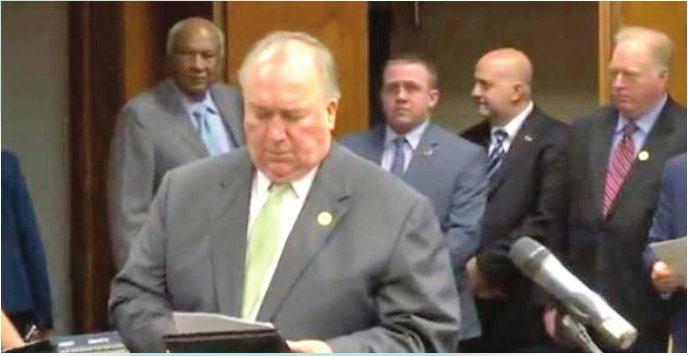
“They didn’t get assaulted to make money,” Garnett said. “You can have an argument about whether our system is too litigious, but the argument shouldn’t be around these women. Let’s not single out a group of people who were deeply injured.”
To Garnett, the administration’s tone-deafness wasn’t just a matter of legal and fiscal wagon circling.
“People were defending [MSU] saying, ‘Yeah, we had a little problem here, but man, we raised a lot of money,’” Garnett said, referring in part to Joel Ferguson’s cavalier radio interview defending Simon. “They were talking about pluses and minuses, but we’re talking about a monster who pretended to be a doctor, and this many victims — that’s not just another negative on the balance sheet. It’s important and it requires an all-out effort.”
What next?
Reclaim MSU wants the trustees to create a new governing board —the University Board — that would add two faculty members, a graduate student and an undergraduate student, all with voting rights, to the elected trustees. They want coming presidential search to be conducted openly, with public input, and they want the Board of Trustees to drop any pick if two-thirds of the Academic Congress (the faculty) reject it.
MSU’s Faculty Senate has endorsed the proposals.
“I’d like to see a response,” Pegler- Gordon said. “Although they typically don’t respond to anything the faculty proposes.”
The next big test for the university, in Garnett’s view, will be the presidential search. (One professor who asked not to be named said the university is “stuck with Engler” as interim president; another said he was useful as a “temporary shit magnet.”) “I’ve been here 19 years,” Garnett said. “The last presidential search is one where there was no search. Lou Anna had a reputation and record here, and maybe that made sense, but we’re overdue for arguing with ourselves about what kind of president we need. Is it just a super-fundraiser or someone who can supervise athletics? What else?” Above all, the new president should be “present,” Garnett said.
“I have a vision of a president that occupies Cowles House, has dinner with students, is engaged, cares about people who were mistreated,” he said.
He feels the same way about the trustees.
“They need to get out more,” Garnett said. “They can’t just get their information from the provost or the president or by being at selected student events. If you went around and asked deans how often trustees had ever been to their college, there wouldn’t be a lot of examples.”
Dollars and bells
The Nassar scandal and subsequent fallout leave MSU with a lot of unanswered questions this spring.
In January, Moody’s Investor Service placed MSU’s credit rating under review to assess the “financial, legal or reputational impacts” from the Nassar scandal, including “student demand and fundraising.” The agency also said it would track “the strength of the university’s management and governance.”
A rating downgrade could affect about $975 million in long-term debt now held by MSU.
Total donations to MSU fell by 25 percent in the second half of 2017, but it’s hard to tell how much of the decline is attributable to the Nassar scandal or how much more of a hit the university will take.
In April, the Mastercard Foundation pulled out of a nine-year, $45 million program that offers students from sub-Saharan Africa scholarships to study at MSU. The program began in 2012. The foundation cited the need to provide a “safe environment” for students and said it had “lost confidence” in its partnership with MSU.
Ramifications like these, along with the yet-unknown sum it will take to settle hundreds of suits filed by Nassar survivors, may put entire academic programs in peril, according to Stephen Esquith, dean of MSU’s Residential College in Arts and Humanities.
Esquith fears colleges like his will be the first to go if there is a budget crunch.
“There is the danger that the costs will be so high that the university may have to centralize services, narrow its mission and become more like a polytechnic institute,” Esquith wrote in a May 1 column in the Washington Post blog Answer Sheet.
Professors aren’t the only ones who are worried.
Last weekend, a job market work shop at MSU brought a raft of questions from graduate students.
“They ask how the Nassar scandal will affect their chance to get a job and what to say if it comes up in interviews,” Quispe-Agnoli said. “They are really concerned.”
And they are not the only ones in crisis mode.
“It’s horrifying,” Nawyn said. “A lot of faculty are questioning whether or not they should give their time and talents to an institution that would do such a poor job of protecting patients. We’re all just sick about what happened.”
But MSU is a sprawling, diverse juggernaut where life can’t help but go on.
Atoms are smashed, operas are sung, plant genomes are mapped out, and thousands of students hustle for good grades and better jobs.
Saturday, on a bridge over the Red Cedar near the library, Kanmani Govardhanan celebrated her graduation with two friends. They stopped to pet a huge St. Bernard.
Govardhanan graduated in hospitality business earlier that afternoon, and was wearing extra sashes for high grades and for the honors college. She plans to study abroad in Norway this summer.
“MSU has some more work to do for sure,” she said. “It seems like there is still a lot of scandal. People aren’t happy with what’s been done so far so I hope they fix that.”
But she doesn’t feel that her diploma is tarnished.
“It’s obviously two different things.
MSU has a bad reputation right now but it’s not a bad school academically.”
Another graduate walked past, barefoot, carrying her heels in one hand and a bouquet in the other.
Kathryn Knoth was one of only 10 graduates Saturday in a newly minted degree — human capital and society. She’s headed for an internship with an automotive supplier in Northville and plans to come back to MSU for grad studies in the fall. Like many grads, Knoth preferred to focus on the positive side of a bad year.
“It’s brought the university community closer in general,” she said. “As far as everyone in my classes, my friends, we’ve become a lot closer during the healing process.”
Over at Beaumont Tower, Conor Sych celebrated his newly earned degree in construction management. He was holding a hardhat along with his mortarboard. This summer, he’s going to Dublin, Ireland to work as a construction engineer.
“When I was applying for a jobs over there, they didn’t know anything else about Michigan State but the Nassar scandals,” Sych said. “But I’ve noticed the morale on campus has picked up in the last month. We’re a great institution overall and I think we’ll rebound from it.”
Behind Sych and his friends, a plaque on the wall of Beaumont Tower tells that the bells went silent for years, out of neglect, until they were repaired in 1996. Now you can feel the clang of the historic chimes in your feet if you stand close enough.
When the bells rang again, the plaque reads, “Spartans everywhere rejoiced.”

1993 - Larry Nassar gets osteopathic medical degree at MSU.
1994 - Nassar begins to sexually abuse an MSU gymnast, according to 2016 lawsuit.
1997 - Nassar becomes team physician at MSU. A parent raises concerns to Olympic gymnastics coach John Geddert about Nassar, but Geddert doesn’t notify police, according to a lawsuit filed in 2017.
1998 - A student–athlete at MSU reports concerns regarding Nassar to trainers or coaches, but the university “failed to take any action” as a result, a lawsuit later claims.
2000 - A second student–athlete at MSU reports concerns regarding Nassar to trainers or coaches, but the university “failed to take any action” as a result, according to a lawsuit filed in 2017.
2000 - Rachael Denhollander, a gymnast who later files a criminal complaint against Nassar, says she was sexually abused by Nassar during treatments for lower back pain in 2000. She was 15 at the time.
March 2014 - Amanda Thomashow files Title IX report against Nassar. She later said it was “brief and sloppy” investigation left her feeling “worthless.”
April 2014 - MSU Office of Inclusion and Intercultural Initiatives opens Title IX investigation after patient complaint about Nassar’s sexual misconduct.
Sept. 2015 - The Dept. of Education’s Office for Civil Rights found that MSU was in violation of Title IX from 2009 to 2014, ruling that the school’s “failure to address complaints of sexual harassment and sexual violence in a prompt and equitable manner caused and may have contributed to a continuation of a sexually hostile environment.”

Aug. 29, 2016 - Former gymnast Rachel Denhollander files a criminal complaint against Nassar with MSU Police alleging that in 2000, at age 15, she was sexually abused by Nassar.
Aug. 30, 2016 - MSU relieves Nassar of clinical and patient duties.
Sept. 2016 - Reports of Nassar abuse become public.
Sept. 8, 2016 - Former Olympic medalist files a civil lawsuit in California, alleging sexual abuse by Nassar.
Sept. 20, 2016 - MSU fires Nassar from his position as associate professor in College of Osteopathic Medicine.
Oct. 6, 2016 - Michigan Attorney General Bill Schuette announces he will review accusations against Nassar.
Dec. 16, 2016 - Nassar indicted on federal child pornography charges.

Jan. 10, 2017 - 18 victims file a federal lawsuit against Nassar, MSU, USA Gymnastics and John Geddert’s Twistars gymnastics club, alleging sexual assault, battery, molestation and harassment between 1996 and 2016.

March 27, 2018 - Former dean of MSU College of Osteopathic Medicine William
Strampel charged with misconduct in office, fourth-degree criminal sexual conduct
and two counts of willful neglect of duty in connection with Nassar scandal.
Feb. 13, 2018 - MSU Faculty Senate votes no confidence in Board of Trustees by 61-4 vote.
Feb. 5, 2018 - Nassar sentenced to another 40 to 125 years in Eaton County for three counts of sexual misconduct; 60 more victims make impact statements.
Jan. 31, 2018 - Trustees unanimously approve former Michigan Gov. John Engler as interim president of MSU.

Jan. 24, 2018 - Lou Anna Simon resigns as MSU president.
January 2018 - NCAA launches investigation of MSU athletic department’s handling of Nassar abuse claims.
Jan. 27, 2018 - Michigan Attorney General Bill Schuette opens investigation into Nassar matter, names former Kent County prosecutor William Forsyth special prosecutor.
Jan. 16-17 2018 - Nassar sentenced to 40 to 174 years in prison on seven counts of criminal sexual misconduct; 156 women and girls give impact statements.
Feb. 22, 2017 - Police secure warrants for 22 new sexual assault charges against Nassar. More than half are directly related to his work as a doctor at MSU’s sports medicine practice and the rest are tied to his work with Twistars Gymnastics Club.

Feb. 13, 2017 - Gymnastics Coach Kathy Klages is dismissed by MSU after a woman claims in court records that Klages in the late 1990s had discouraged her from filing a sexual assault complaint against Nassar.

April 24, 2018 - USA Today sports reporter Nancy Armour describes MSU as a “cesspool with seemingly no bottom.” April 21, 2018 - AP reports that MSU “maintained ties to a prominent volleyball coach [Rick Butler] for decades after he was publicly accused in 1995 of sexually abusing and raping six underage girls he trained in the 1980s.”
April 20, 2018 - Students, survivors, supporters gather at “Rally for Resignations” in front of MSU Administration Bldg.

March 28, 2018 - Engler allegedly offers Nassar survivor Kaylee Lorincz $250,000 to drop complaint; Engler aide Carol Viventi calls the claim “outrageously distorted” and says Lorincz is trying to “set up” the university, sparking outrage among Nassar survivors and their supporters.
Support City Pulse - Donate Today!
Comments
No comments on this item Please log in to comment by clicking here